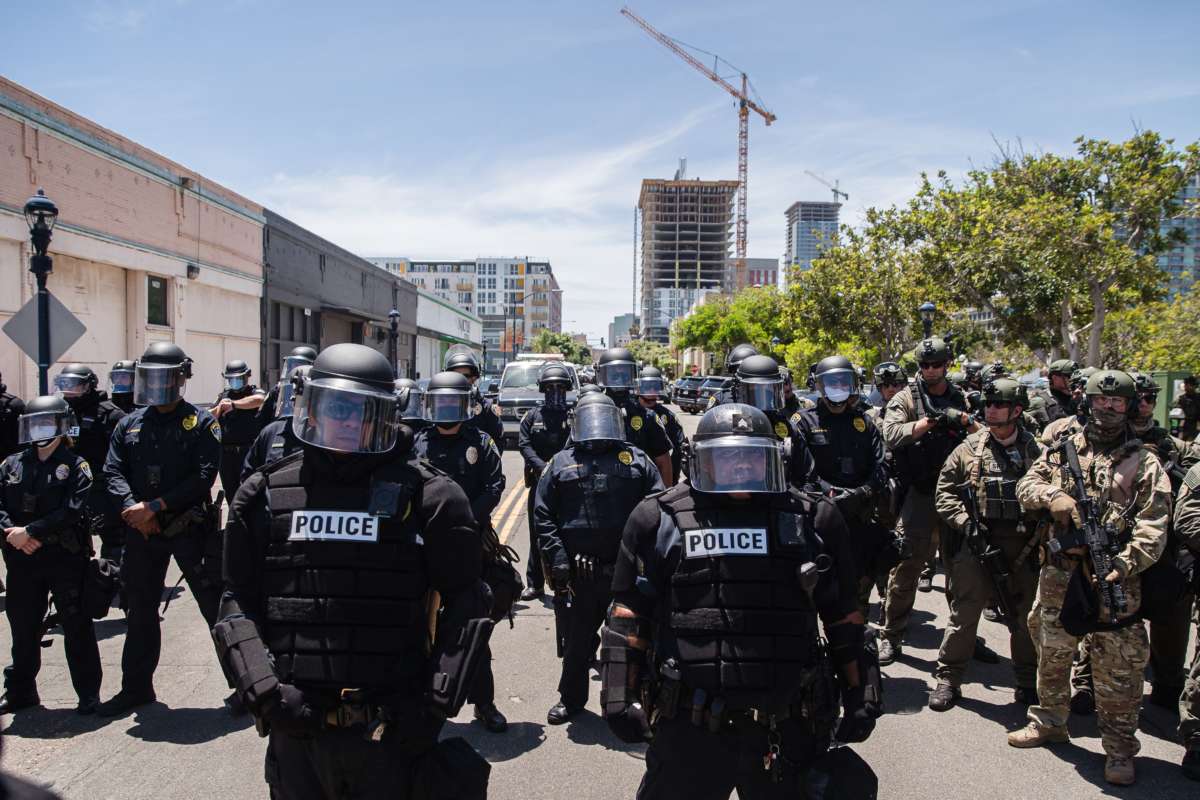With the militarization of local police forces on full display as heavily armed cops and armored vehicles patrol the streets and crack down on protests over the killing of George Floyd, Sen. Brian Schatz on Sunday said he plans to introduce an amendment to end the federal program that permits the transfer of excess military equipment to police departments across the nation.
“I will be introducing an amendment to the National Defense Authorization Act to discontinue the program that transfers military weaponry to local police departments,” the Hawaii Democrat tweeted late Sunday.
Julián Castro, the former Housing Secretary, applauded Schatz’s proposal, warning that “as long as our police arm up like a combat force, they’ll act like it.”
Share widely: National guard and MPD sweeping our residential street. Shooting paint canisters at us on our own front porch. Yelling “light em up” #JusticeForGeorgeFloyd #JusticeForGeorge #BlackLivesMatter pic.twitter.com/bW48imyt55
— Tanya Kerssen (@tkerssen) May 31, 2020
President Donald Trump in 2017 rolled back Obama-era limits on the 1033 Program, which authorizes the Defense Department to send military equipment and weapons to local police departments. As NBC reported at the time, “Congress created the program in 1990 during the height of the war on drugs for federal and state law enforcement agencies, and it was expanded seven years later to include all law enforcement departments.”
“Since the program’s inception,” NBC noted, “more than $5.4 billion in equipment has flowed to police.”
A 2017 study found that transferring military equipment to law enforcement agencies led to more people killed by police.
Basically, having access to military equipment can change the organization, operations and culture of department too.https://t.co/DWv2sIPicZ pic.twitter.com/FFZ0YREfD3
— Mira Rojanasakul (@rjnskl) June 1, 2020
The response by local law enforcement to the nationwide uprising that followed Floyd’s killing has heightened scrutiny of the 1033 Program, with lawmakers and activists warning that access to military hardware has made police behavior toward protesters even more brutal and violent.
“Militarizing local police forces doesn’t make our communities safer,” tweeted Rep. Pramila Jayapal (D-Wash.), co-chair of the Congressional Progressive Caucus.
Philip McHarris, a PhD candidate in sociology and African American studies at Yale University, wrote in an op-ed for the Washington Post last week that “police departments have come to resemble military units, contributing to deadly violence disproportionately against black Americans.”
“The cycle of police brutality sparking unrest, and that unrest being met by the militarized police is increasingly familiar in modern American society,” wrote McHarris. “Tough-on-crime policies and militarized police departments have paved the way for increased police contact and tragic violence. Reducing the capacity for police to engage in routine and militaristic violence is the only way to break recurring cycles of police killings and the militarized response that protests of them are often met with.”
Angry, shocked, overwhelmed? Take action: Support independent media.
We’ve borne witness to a chaotic first few months in Trump’s presidency.
Over the last months, each executive order has delivered shock and bewilderment — a core part of a strategy to make the right-wing turn feel inevitable and overwhelming. But, as organizer Sandra Avalos implored us to remember in Truthout last November, “Together, we are more powerful than Trump.”
Indeed, the Trump administration is pushing through executive orders, but — as we’ve reported at Truthout — many are in legal limbo and face court challenges from unions and civil rights groups. Efforts to quash anti-racist teaching and DEI programs are stalled by education faculty, staff, and students refusing to comply. And communities across the country are coming together to raise the alarm on ICE raids, inform neighbors of their civil rights, and protect each other in moving shows of solidarity.
It will be a long fight ahead. And as nonprofit movement media, Truthout plans to be there documenting and uplifting resistance.
As we undertake this life-sustaining work, we appeal for your support. Our fundraiser ends at midnight tonight! We still need 163 new monthly donors to hit our goal. Please, if you find value in what we do, join our community of sustainers by making a monthly or one-time gift.
